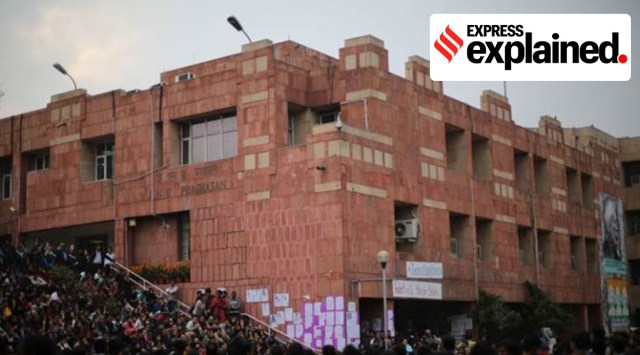Explained: What is JNU’s deprivation points model for admissions?
JNU VC Santishree Dhulipudi Pandit said the return of deprivation points, a model of admission unique to JNU in India, is being considered.
 Under the deprivation points model, extra marks are added to the total entrance test score of a disadvantaged student. (File photo)
Under the deprivation points model, extra marks are added to the total entrance test score of a disadvantaged student. (File photo)The Jawaharlal Nehru University (JNU) is considering the reintroduction of the deprivation points model for research students, a unique feature of the university’s admission process, Vice Chancellor Santishree Dhulipudi Pandit said on July 10.
Under the leadership of former VC and current UGC chairman, M Jagadesh Kumar, the university had discontinued the deprivation points model in 2017 for research degree admissions, such as MPhil and PhD. It, however, continued for admissions into the undergraduate and masters programmes.
Teachers and students have long demanded the return of such a model that aims to facilitate the entry of aspiring women-students and those from backward regions.
What is JNU’s deprivation points model?
Under the deprivation points model, extra marks are added to the total entrance test score of a disadvantaged student. The JNU is the only university in the country to have such a system.
The deprivation system classifies India’s districts in terms of developmental quartiles, based on 4 criteria: percentage of rural population, percentage of agricultural workers, percentage of illiteracy among females and percentage of households with no latrines within the premises.
Quartile 1 districts are considered to be the most backward. According to the current admission policy for undergraduate and masters, “The candidates who are hailing from Districts of Quartile 1 and 2 (districts in which the candidates normally reside) and/or who have passed their qualifying examination through distance education programme are also awarded deprivation points.”
Those from Quartile 1 are given 5 deprivation points, while those from Quartile 2 are provided 3 deprivation points.
In addition to regional backwardness, 5 deprivation points are also given to women and transgender candidates and 5 are given to Kashmiri migrants as well. Wards and widows of defense personnel are also given 5 points.
According to the current system, a student can only receive a maximum of 10 deprivation points to mitigate the regional, economic, educational and gendered disadvantage that they might have. This system does not affect the seats reserved for SC, ST and OBC students.
When were deprivation points introduced in JNU?
The JNU Act of 1966 enshrines “social justice” as one of the university’s objectives. The university’s admission policy also states that it seeks to ensure that an adequate number of students from “under-privileged and socially handicapped sections of our society are admitted,” to ensure that an all-India character of the university can be maintained, with a “fair representation of students especially from different regions of the country especially the backward areas”.
According to a 2019 press release by the JNU Students Union (JNUSU), deprivation points were first introduced in 1973.
The basis for this decision was to make the public university a more inclusive space and enable the entry of students from diverse socio-economic backgrounds, especially women and the most disadvantaged students from backward regions. The deprivation model was reportedly withdrawn entirely for nearly a decade in 1984, but was restored for the 1995-1996 academic year after student protests, the JNUSU claimed.
When was the system last altered?
In 2017, the JNU administration abandoned the deprivation points system for admissions in MPhil and PhD programmes, after the Delhi High Court directed the university to follow the 2016 University Grants Commission (UGC) guidelines “without any deviation.”
The guidelines had recommended giving 100% weightage to viva-voce marks and making the entrance test (with qualifying marks of 50%) as the sole qualifying criteria for MPhil and PhD admissions.
In 2018, the regulation was amended to give 70% weightage to entrance tests and 30% to the viva-voce, after long standing protests by SC, ST and OBC students who felt that this would put students from marginalized sections at a disadvantage, as they might not have strong communication skills.
The university officials had justified the decision of removing deprivation points by stating that the UGC guidelines did not mention such a system. They, however, maintained that the deprivation system would continue for undergraduate and masters programmes.
What have been the arguments for restoring it?
Students and teachers from the JNU have stridently argued that such a system is essential for maintaining the university’s inclusive nature and its commitment to social justice. They claim that such values would be lost if the diverse mix of caste, class, region and gender within the university would cease to exist.
The JNUSU says that the removal of the deprivation points system in 2017 had a significant impact on student intake. The number of students enrolled in MPhil and PhD programmes with family income below ₹6,000 per month dipped from 25.8% in 2016-2017 to 9.8% in 2017-2018, and those from rural backgrounds reduced from 48.4% to 28.2% during the same period, the student body claimed in data shared by it on a social media platform.
The JNU Teachers Association (JNUTA) said that between 2017 and 2022, the intake of students in research programmes reduced by over 20%, and that the removal of deprivation points has led to significant loss in regional diversity, with fewer students from southern and northeastern states enrolling for MPhil and PhD courses.





- 01

































